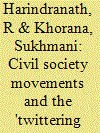| Srl | Item |
| 1 |
ID:
132273


|
|
|
|
|
| Publication |
2014.
|
| Summary/Abstract |
Using Partha Chatterjee's insights on the formation of 'civil society' and how this is distinct from 'political society', this paper theorises the mobilisation of popular support via social media during the so-called 'anti-corruption movement' in India in 2011. It tracks the main themes of the civil society-led movement's Twitter feeds during two crucial phases of fasting by its self-proclaimed Gandhian leader, Anna Hazare. This highlights the mixing of nostalgic pre-independence discourses with new media savvy and provides a means of contextualising what such discursive mobilisation means for contemporary political formations in a post-colonial society such as India. The case study also sheds light on the urban- and middle-class-centred nature of the protest and its preference for media over electoral representation-this is in line with Chatterjee's conceptualisation of a civil society that undermines the authority of the state and excludes the rural and urban poor.
|
|
|
|
|
|
|
|
|
|
|
|
|
|
|
|
| 2 |
ID:
085174


|
|
|
|
|
| Publication |
2008.
|
| Summary/Abstract |
This paper argues for an approach to researching citizenship and democracy that begins not from normative convictions but from everyday experiences in particular social, cultural and historical contexts. The paper starts with a consideration of the ways in which the terms 'democracy' and 'citizenship' have been used in the discourses and approaches taken within mainstream studies of citizenship and democracy, drawing attention to some of the conceptual blind spots that arise. We call for more attention to be paid to contextual understandings of the politics of everyday life, and to locating state, ngo and donor rhetorics and programmes promoting 'active citizenship' and 'participatory governance' within that politics. It is this kind of understanding, we suggest, that, by revealing the limits of the normativities embedded in these discourses, can provide a more substantive basis for rethinking citizenship from the perspectives of citizens themselves.
|
|
|
|
|
|
|
|
|
|
|
|
|
|
|
|